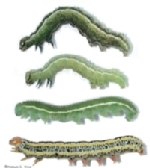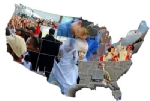Data Sets
Forest Caterpillar Ecology (Michael Singer Lab, Wesleyan University)

This ecological study is aimed at understanding food web structure in a forest ecosystem. At the heart of this food web are tri-trophic interactions: the ecological and evolutionary processes driving feeding relationships between terrestrial plants, insect herbivores, and carnivores that eat insect herbivores. To study tri-trophic interactions in food webs, this data set focuses on caterpillars. Caterpillars have large impacts on forest ecosystems: facilitating the cycling of nutrients among components of the food web, harming or helping individual trees survive and reproduce (depending on the intensity of herbivory), acting as food other organisms that eat caterpillars (e.g., many bird species that breed in forests, spiders, and many others). In addition to familiar predators, caterpillars are food or hosts for lethally parasitic insects called parasitoids (over 60,000 species worldwide). This data set measures forest trees, caterpillars, and parasitoids to better understand how these food webs are structured. Click here for more information.
AddHealth (Public Access - Wave 1)
 The National Longitudinal Study of Adolescent Health (Add Health) is a nationally representative study that explores the causes of health-related behaviors of adolescents in grades 7 through 12 and their outcomes in young adulthood. Add Health seeks to examine how social contexts (families, friends, peers, schools, neighborhoods, and communities) influence adolescents health and risk behaviors. It is a school-based study of the health-related behaviors of adolescents. Click here for more information.
The National Longitudinal Study of Adolescent Health (Add Health) is a nationally representative study that explores the causes of health-related behaviors of adolescents in grades 7 through 12 and their outcomes in young adulthood. Add Health seeks to examine how social contexts (families, friends, peers, schools, neighborhoods, and communities) influence adolescents health and risk behaviors. It is a school-based study of the health-related behaviors of adolescents. Click here for more information.
Connecticut Mastery Data

De-identified data on demographic characteristics and Connecticut Mastery Test performance has been made available to us by a local school system. The Connecticut Mastery Test (CMT) is a compulsory standardized test administered in the spring of each year to all Connecticut students in grades 3rd – 8th. The test contains a mathematics, reading, and writing portion for each grade, with an additional section in science for grades 5 and 8 only. The State Department of Education has developed specific criteria, in part with the No Child Left Behind Act, to determine standards of mastery.
Executive Orders

The Policy Agendas Project constructed a data set containing information about each of the presidential executive orders issued from 1945 to 2003. Sample variables include the name of the president, the president’s political party, whether or not congress was divided at the time the order was issued, and whether the order was issued at the end of the president’s term. Additionally, each executive order is categorized by content into one of 19 major topics and 225 subtopics.
The General Social Survey (Public Access)
The General Social Survey (GSS) conducts basic research on the structure and development of American society with a data-collection program including demographic, behavioral, and attitudinal questions for a Nationally representative sample of adults. Click here for more information.
We are currently building an archive of large data sets for use in introductory statistics courses and beyond. If you have any data sets to recommend or share, please contact Lisa Dierker, Project PI at ldierker@wesleyan.edu.